CBD for women’s health? According to a survey of 1281 women by BDS Analytics, menstruation, menopause, and sex are listed as the top 3 reasons females choose cannabis for self-care. In this article we’ll look at the CBD’s therapeutic value for reproductive health, the science and studies behind the claims, a few testimonials and look at some of the best practices for using and purchasing CBD oil in Canada and other jurisdictions where it is legal.
Full Disclosure: Linked products in this article point to items for sale in our shop. We hope you’ll find these trusted product recommendations helpful!
Even the Queen was using it!
Before the days of prohibition, it was commonplace for doctors to prescribe cannabis-based remedies—particularly for relief from gynecological conditions. In fact, even Queen Victoria was using oils rich in CBD to relieve her menstrual pains in the 19th century!
The earliest written records of using cannabis to treat gynecological conditions date back around 4,000 years to Ancient Mesopotamia and Egypt, where they were used for difficult childbirths and other female ailments. Recipes containing cannabis seeds, flowers, stems and extracts spread throughout Asia and Africa, finding their way to Europe in the Middle Ages and later to the Americas.
Indeed, physicians across the globe were prescribing cannabis, often in combination with other herbs, for a host of gynecological conditions. Archival medical texts from the 1800’s describe cannabis formulations effective for:
- Aphrodisiac uses
- Painful menstrual cramps
- Heavy bleeding
- Painful urination
- PMS
- Pain during sex
- Nausea during pregnancy
- Menopause
- Gonorrhea
- Post-partum hemorrhage
- Difficult childbirth
When prohibition barred cannabis from use as medicine in the early 20th century, it was to the medical community’s deep chagrin.
CBD for women’s health? What is it and how does it work?
Cannabidiol (CBD), is a non-psychoactive compound produced by hemp plants. CBD interacts powerfully with the human endocannabinoid system (ECS)–which regulates everything from pain, to mood to motivation. Unlike the THC from cannabis, CBD does not get you “high.” It is purely medicinal.
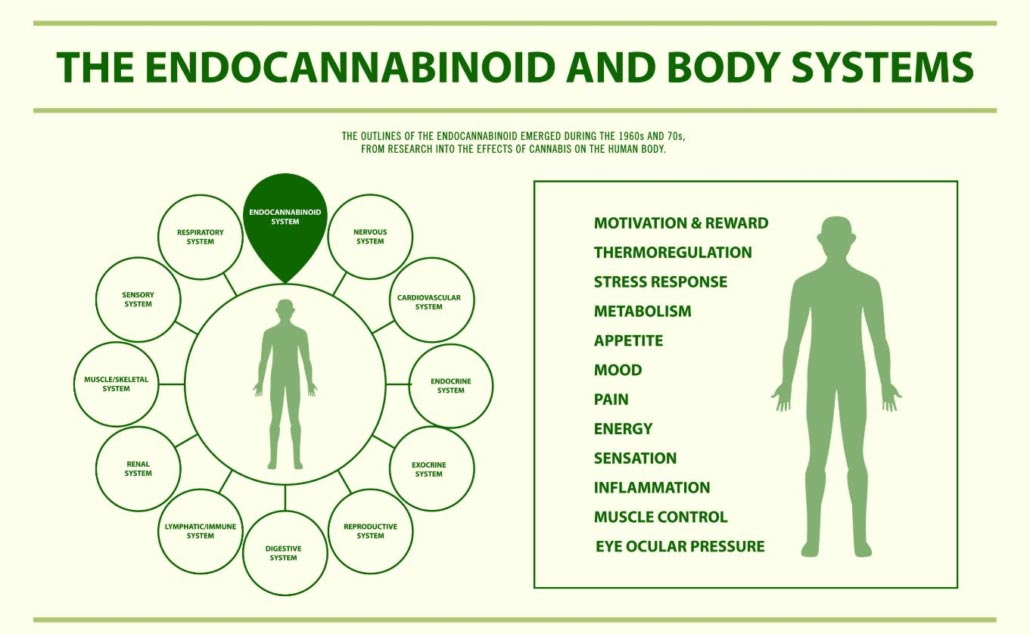
Endocannabinoids in the reproductive tract
Endocannabinoid receptors are widespread within the female reproductive system. They are found in the Fallopian tubes, ovaries, vagina, vulva and are most densely concentrated in the uterus. Endocannabinoid receptors are associated with:
- nerves in which they mediate sensations
- immune cells where they control inflammation
- glands in which they influence hormone secretion
- muscles where they facilitate energy usage.
The prevalence of endocannabinoid receptors in our reproductive systems might explain why CBD suppositories seem to be so helpful in treating people’s pelvic pain — be it from menstrual cramps, painful sex, endometriosis, vulvodynia or fibromyalgia, according to Felice Gersh, a board-certified OB-GYN and founder of the Integrative Medical Group in Irvine, California.
CBD is easily absorbed through skin and mucuous membranes, with a bioavailability rate somewhere around 45%. The vagina’s mucous membrane readily absorbs medicinal products, which makes vaginal suppositories uniquely suited to treating some conditions in a more targeted way.
CBD for PMS and menstrual cramps
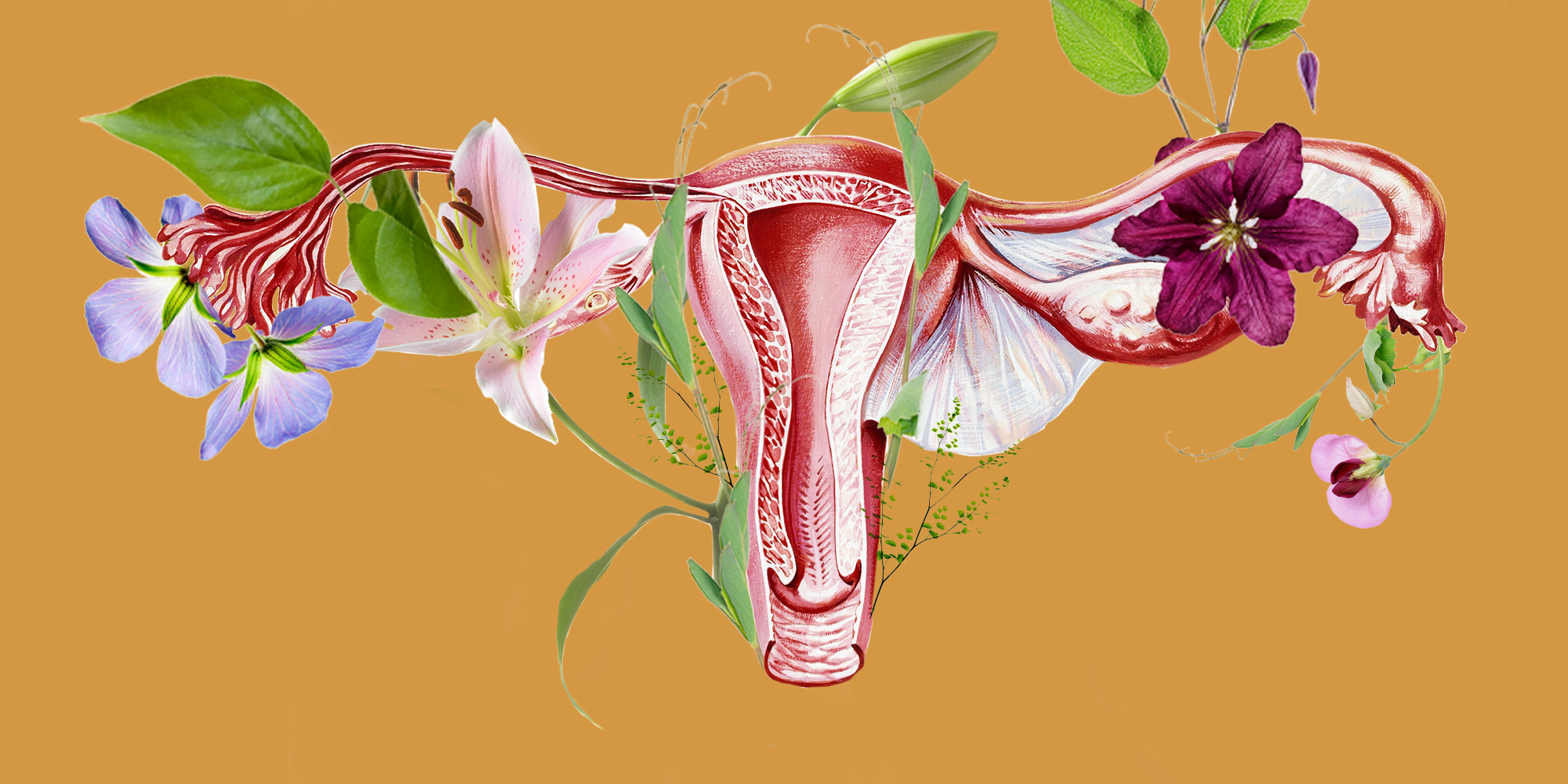 “More than half of women who menstruate have some cramping for one or two days each month, and 15 percent have severe menstrual cramps,” says Carol Livoti, MD, a gynecologist in New York City and fellow of the American College of Obstetricians and Gynecologists. If that predicament sounds familiar, you are not alone. Up to 90% of reproductive-age women can suffer from painful periods.
“More than half of women who menstruate have some cramping for one or two days each month, and 15 percent have severe menstrual cramps,” says Carol Livoti, MD, a gynecologist in New York City and fellow of the American College of Obstetricians and Gynecologists. If that predicament sounds familiar, you are not alone. Up to 90% of reproductive-age women can suffer from painful periods.
There are two ways Cannabinoids affect pain. First, by desensitizing pain-perceiving nerves, and second by reducing inflammation—a major contributor to pain. Our ancestors in the medical community likely treated pelvic pain with cannabinoids for precisely those reasons.
Nowadays, with the legalization of CBD products, women in great numbers are claiming CBD and THC products to be among the best tools they have for treating painful periods. But how does CBD for women’s health compare to non-steroidal anti-inflammatory drugs (NSAIDs) like Ibuprofen?
Quite well as it happens. CBD works in the same was as Ibuprofin, by decreasing your body’s production of inflammatory prostaglandins—the compounds that stimulate painful cramps. THC & CBD actually reduce the physical intensity of cramps plus your ability to feel pain.
Where CBD outperforms NSAIDs is with side effects. NSAIDs are known to have several gastrointestinal side effects. CBD preferentially inhibits enzyme COX-2, which means CBD’s anti-inflammatory benefits come without gastrointestinal side effects.
Prostaglandins (particularly one called PGF2⍺) peak during menstruation, with the following effects:
- Inflammation: certain prostaglandins trigger inflammation, which causes more pain.
- Pain sensitization: prostaglandins can actually increase pain-perceiving nerves’ sensitivity to pain.
- Vasoconstriction: prostaglandins produced during menstruation stimulate blood vessels to constrict, reducing blood flow to endometrial tissue.
- Uterine contractions: People with elevated prostaglandin levels experience stronger, more painful contractions, which doctors now acknowledge can be as intense as heart attack pain.
- Heavy bleeding: Unusually heavy periods may result from excessive inflammation, which increases tissue damage. People with heavy bleeding have higher levels of the enzyme COX-2, which produces prostaglandins.
- Diarrhea: Prostaglandins also trigger smooth muscle contractions in the digestive tract, leading to premature bowel movements.
Although you can’t entirely eliminate prostaglandins, you can reduce the discomforts caused by prostaglandins. Here are all the properties CBD and other cannabinoids possess that reduce painful menstrual cramps:
- Anti-inflammatory: Cannabinoids target much more than just prostaglandins. For instance, THC activates endocannabinoid receptors CB2. When these are activated, they prevent macrophages from releasing inflammatory proteins called cytokines.
- Pain-relieving: Although prostaglandins and other inflammatory molecules can make pain-perceiving nerves more sensitive, cannabinoids fight back by desensitizing these nerves. Both CBD and THC target nerve receptors that help decrease the sensation of pain (TRPV1 and CB1, respectively). Additionally, not only does CBD desensitize TRPV1, but those soothing effects can spread to neighboring pain receptors.
- Muscle-relaxing: Menstrual cramps are exacerbated by contractions of the smooth muscle lining the uterus — and cannabinoids are known to relax smooth muscles. THC and CBD both target different receptors embedded in the muscle tissue to relax contractions.
- Vascular-relaxing: Blood vessels are lined with smooth muscle. When cannabinoids trigger this smooth muscle to relax, blood flow increases. Increased blood flow could help provide relief to oxygen-starved tissues, further decreasing painful cramps.
Perhaps this is why people have been using cannabis to treat period pain for millennia. Though an increasing number of doctors are becoming aware of cannabinoids’ capacity to relieve menstrual cramps, most are only just beginning to hear from their female patients about how well cannabinoids have worked for their periods.
CBD for menopause
Unfortunately, women often find the medical system woefully unprepared to deal with menopause. Due to a long history of society ignoring women’s reproductive issues, the medical system has only just recently started taking the needs of peri- and post-menopausal women seriously. This is a reason why more women are talking about CBD for women’s health. 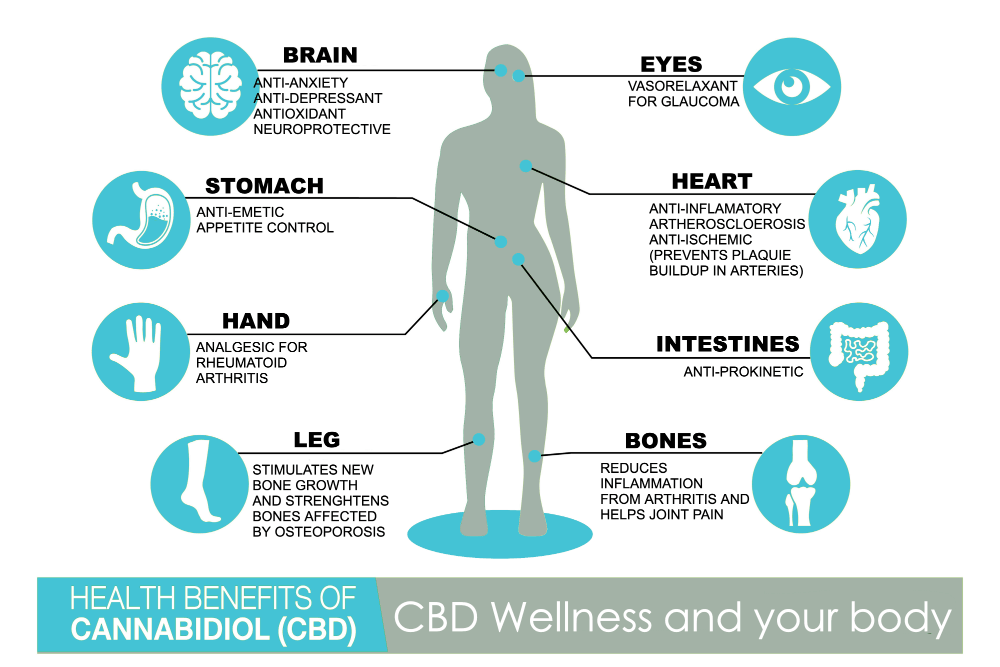
CBD’s good reputation for treating peri- and post-menopausal symptoms isn’t based on anecdotal evidence alone. Scientific research indicates cannabidiol (CBD) could be useful for:
- Aches & joint pain
- Mood swings or depression
- Weight gain / diabetes
- Hot flashes
- Genitourinary syndrome (vaginal dryness, atrophy and bladder control problems)
- Osteoporosis
- Sleep disruptions / insomnia
- Memory loss
Let’s look at some of these in detail and explore how beneficial CBD for women’s health might be:
Aches & Joint Pain
Without estrogen, women’s bodies produce higher levels of the inflammatory molecule TNFα (tumor necrosis factor). As a result, arthritis symptoms can skyrocket during menopause. Tellingly, more than 60% of women aged 40 to 64 suffer from muscles and joint pain.
Reducing inflammation during menopause is one of the most important health practices women can engage in. Fortunately, CBD is known to be a powerful anti-inflammatory. In mice, CBD is anti-arthritic, protects joints against inflammatory damage, and lowers levels of inflammatory TNFα. Additionally, low-impact exercise and dietary changes are highly recommended practices for fighting against inflammation.
Mood Swings & Depression
If you’re experiencing anxiety or depression during menopause, you are not alone. In the U.S. an estimated 20% have depression at some point during menopause. Estrogen and progesterone influence serotonin and other neurotransmitters which directly affect mood. As levels of these hormones become erratic and eventually plummet, neurochemistry changes.
If you’re emotionally distressed, it’s important to first seek out professional medical advice. A professional can recommend therapeutic or pharmaceutical solutions which you could supplement with CBD oil. CBD activates serotonin receptors, in ways comparable to anti-anxiety drug buspirone. A 2018 review of existing studies concluded CBD had anti-stress effects, which may reduce depression related to stress.
Hot Flashes & Night Sweats
People joke about hot flashes, but they can be more than just a nuisance. They disrupt our sleep and therefore our wakefulness, productivity and quality of life. These “vasomotor” symptoms are caused by altered neurochemistry in the hypothalamus—your body’s cooling system. Blood vessels dilate and sweat responses get switched on far more easily than usual.
Although there aren’t studies specifically investigating CBD for hot flashes, it turns out that CBD for this women’s health issue is actually quite popular, many women swear by it! This is likely the result of CBD’s relationship with seratonin. CBD also regulates the sleep/wake cycle to enhance sleep, recovery and wakefulness.
Weight Gain & Diabetes
Studies have found that adults using cannabis products have lower insulin levels and smaller waist circumferences. CBD may contribute by switching on genes for healthy metabolism (through the PPAR-γ receptor). CBD also helps regulate natural endocannabinoids, including 2-AG, which increases during menopause and is linked to insulin resistance.
Genitourinal Syndrome (Vaginal Dryness, Atrophy & Bladder Control)
 Sexual health and bladder control after menopause are now looked at as a single medical condition. Estrogen directs the body to keep blood flowing to the pelvic region, which delivers vital oxygen to our urinary tract and sexual organs. This keeps tissues there elastic and healthy. When one senses the onset of menopause, it becomes important to give the pelvic area extra love and attention to keep the blood flowing.
Sexual health and bladder control after menopause are now looked at as a single medical condition. Estrogen directs the body to keep blood flowing to the pelvic region, which delivers vital oxygen to our urinary tract and sexual organs. This keeps tissues there elastic and healthy. When one senses the onset of menopause, it becomes important to give the pelvic area extra love and attention to keep the blood flowing.
In addition to sexual activity, lubricants that contain CBD and/or THC—both potent vasodilators—can increase blood flow to the pelvic region. This keeps tissues healthy and moisturizes the vaginal canal. Topical CBD also fights inflammation, relaxes muscles and calms pain-perceiving nerves in the vulva and vagina—no doubt the main reasons CBD-infused lubes and suppositories are becoming so popular.
Osteoporosis
As we enter perimenopause, our bodies change the circulation of calcium and magnesium in our bones. The result is often a reduction in bone density and increasing risk for fractures. Though the importance of dietary calcium and exercise for preventing osteoporosis is commonly understood, new research suggests that inflammation from arthritis or other conditions might be one of the biggest causes of bone resorption. Inflammatory TNFα (tumor necrosis factor) is particularly adept at telling your body to increase bone resorption.
In Canada, CBD oil is already a popular remedy for arthritic symptoms, and its powerful anti-inflammatory properties might also prove useful for bone health. Though more research needs to be done for humans, in rats with periodontitis, CBD has lowered TNFα levels and prevent oral bone loss. As bone loss becomes a concern, it’s very important to engage in regular resistance training, as it decreases TNFα levels and helps prevent bone loss.
Sleep Disturbances
Sleep deprivation can really wear people down, triggering fatigue and a whole host of other health issues. Menopause disrupts sleep with the onset of night sweats, anxiety or depression. Before you try to address your sleep issues, it’s important to understand why exactly they are happening. If your sleep problems are severe, keep a sleep diary that tracks your daily food, activities and sleep schedule, and ask your doctor for help.
There’s plenty of anecdotal evidence that CBD formulations help people get good, quality sleep. However, CBD’s effectiveness also depends on your personal sleep issues. CBD helps improve sleep by reducing anxiety, chronic pain, the vividness of nightmares as well as by regulating our sleep/wake cycle.
Memory Loss
Memory loss is often blamed on age, but even younger women who go through surgical menopause can experience rapid memory loss. The hippocampus is responsible for memory, learning and emotion. Hormones like estrogen and progesterone encourage neurons in the hippocampus to form new connections. When production of these hormones diminishes, our memories can suffer
CBD can impact brain health by reducing inflammation, reducing oxygen buildup, and by working as a brain stimulant and neuroprotectant.. Though studies show that CBD can reverse declines in cognitive function in mice, more research needs to be done in humans. That being said, CBD has been shown to reduce inflammation that is a core cause of Alzheimer’s symptoms. CBD is also a powerful anti-oxidant. Brain functions weakened by oxygen stress could be improved by using CBD.
CBD and Endometriosis
The women’s health condition where inflammation and pain may well be the most well documented is endometriosis. Women suffering from endometriosis are often in severe pain, particularly during menstruation when the tissue is engorged and sloughs in response to hormonal cycles.
There is no cure yet, but the CBD community has been attentive and responded to this challenge with innovation. Some endometriosis sufferers, for example Whoopie Goldberg—who is deeply passionate about raising endometriosis awareness, have even gone so far as to create their own CBD products for women’s health.
Scientists have found cannabis and hemp extracts can target the root causes of endometriosis in a variety of ways, including by:
- Stopping cell proliferation
- Preventing cell migration
- Inhibiting lesion vascularization (blood vessels)
- Inhibiting lesion innervation (nerves)
- Blocking synthesis of inflammatory prostaglandins
- Modulating the immune response
- Desensitizing nerves that transmit pain
Currently, treatments offered include painkillers, hormone therapy, and risky surgical procedures. These are generally effective in slowing the spread and suppressing the symptoms of endometriosis. Unfortunately, painkillers can come with debilitating side effects, many people respond poorly to hormone therapy, and scar damage from surgery could persist beyond menopause, requiring lifelong pain management. To top it all off, these therapies are often ineffective.
As patients who have had endometriotic lesions surgically removed can attest, endometriosis frequently comes back. However, scientists recently discovered that endocannabinoids are involved in regulating cell-migration. Another possible application of CBD for women’s health: It appears CBD can stop endometriotic cells from migrating by blocking the activation of the GPR18 receptor.
One reason endometriotic lesions might be more painful is their higher density of nerves. Innervation is the process whereby more nerves grow into tissue. Nerves that innervate endometriotic lesions can increase the pain of endometriosis. These nerves also contain endocannabinoid receptors (CB1), and when THC activates this receptor it can help decrease pain. With endometriosis, there is more innervation than necessary. Molecules like CBD interfere with innervation by preventing activation of the CB1 receptor.
Finally, CBD plays a role in desensitizing the pain receptor TRPV1.
CBD for women’s sexual health
If variety in the cannabis lube market is anything to go by, sex-enhancing products laced with CBD and THC are rapidly gaining popularity. With its powers to decrease anxiety, relax pelvic floor muscles, increase lubrication, relax and enhance mood and pleasure, it’s no surprise that CBD has found its way into the bedroom.
 For those of us experiencing menopause, sex becomes far less pleasurable as our vagina gets thinner and produces less lubrication. Also, with fewer acid-producing lactobacilli, we become more susceptible to infection.
For those of us experiencing menopause, sex becomes far less pleasurable as our vagina gets thinner and produces less lubrication. Also, with fewer acid-producing lactobacilli, we become more susceptible to infection.
Sexual activity is important to reproductive health. It triggers our bodies into sending oxygen-rich blood to swell our vulva and vaginal tissues. Oxygen nourishes cells and takes away toxins. Sex boosts levels of androgens and other hormones. It keeps vaginal skin healthy, improves its elasticity and natural lubrication.
Research shows that sexually active women experience less vaginal atrophy, and they don’t necessarily need a partner to experience the benefits!
This, in part, explains the growing popularity of THC and CBD laced lubes and suppositories. These products deliver medical compounds into local nerves, muscles, glands and immune cells while providing lubrication. Will a THC suppository get you high? The answer is no.
Remember, not all sexual activity is born equal. Numerous studies show that it’s the quality of sex that gets you the most benefit. To maximize pleasure, work with your partner to maximize your own comfort and arousal.
One thing to beware of: lubricants and oils that damage condoms. Oil-based lubricants like petroleum jelly, cold cream, butter, or mineral and vegetable oils, including coconut oil, damage latex. Avoid these if you don’t want to get pregnant.
Though more science needs to be done, the anecdotal evidence is really starting to pile up. CBD for women’s health is backed up by a great number of testimonials online, with women praising medicinal cannabis products for doing everything from spicing up their love lives to addressing vaginal and painful sex. Here are but a few:
Cyo Ray Nystrom, founder and CEO, QuimRock
“I personally faced quite the battle with my vagina the minute I started having sex,” Cyo recalls. “I’ve had years of awful UTIs, forcing me to take intense rounds of antibiotics that, in turn, killed off all the natural vaginal flora and caused yeast infections. It affected my life and sex life greatly as vaginal health is such an important part of intimacy and sex for so many people.”
“Personally, cannabis has always been a great tool for getting me into my body, which is essential for me to really show up in my sex life,” Cyo explains, adding, “Cannabis has helped me in many ways—from cramp relief after getting a UTI to pain relief-focused topicals to the amazing benefits of cannabis-infused lubricants.”
Shape Magazine, Rachel Khona
The good news is holy mother of God! This lube might be the greatest contribution to my sex life since the invention of the vibrator.Within minutes, I felt warm and tingly down below. And that was before J even touched me.
Vice, Avital Norman Nathman
My clitoris definitely started tingling, and every usual sensation I get with regular orgasms seemed amplified somehow. I became much more sensitive to the touch, and noticed some increased blood flow in the region, which certainly helped when it came to experiencing just more of all the euphoric physical sensations of sex.
Buzzfeed, Rebecca Norris
CBD Oil Is The Only Thing That Legit Helps My Horrible Period Cramps
I’ve had horrible menstrual cramps for years and these CBD suppositories are the only thing that actually helps.
Huffpost, “Gretchen”
“CBD suppositories have definitely taken the place of pain pills for me, which I didn’t think was possible,” Gretchen, who wished to remain anonymous while talking about marijuana and CBD so it wouldn’t impact her career, told HuffPost. “Once I was aware of my pain scale and kind of the before and after effects, I was like, ‘Whoa, this stuff is powerful.'”
Leafly, Adryan Corcione
CBD suppositories might not be quite as effective with zero THC, but until I live in a place with recreational pot, it’s a decent alternative and definitely a tool I’ll keep in my menstrual self-care kit. I… believe the anal insertion made a big difference compared to vaginal.
Healthline, English Taylor
“At first, the application felt cool and refreshing. Ten minutes later, I noticed how lubricated I was. You know when you can just instinctively tell when things are slippery down there, without even doing a quick finger check? It was like that. In terms of sex drive, I felt stoked to get frisky about thirty minutes after application.”
Conan, Dr. Jennifer Berman, M.D.
“Perimenopausal, menopausal, and post-menopausal women who have noticed a decline in response have had great success with it,” she says of cbd products. “Younger patients who have difficulty achieving orgasm have had enhanced response with it as well.”
Guidelines for buying CBD lubes and suppositories
Health experts suggest choosing organic products made with full-spectrum hemp. Many products contain chemicals, preservatives, glycerin, etc. which can disrupt vaginal flora or cause irritation. Look for a CBD lube or arousal oil that’s all natural, with no synthetics for the best, body-safe experience.
Also be sure to read product packaging carefully to ensure THC and CBD are listed as ingredients. Products made only of hemp oil contain no CBD or THC.
If you’re confused about dosages the mantra of using CBD is “start low and go slow.” Read more about proper CBD Oil Dosage.
Remember! The following can damage latex condoms: oil-based lubricants like petroleum jelly, cold cream, butter, or mineral and vegetable oils—including coconut oil.
For many reproductive system issues, a combination of THC and CBD can be more effective than CBD alone. Do your research, consult your doctor and see if a combination TCH and CBD product might be best for you. CBD usually works best accompanied by the full spectrum of cannabinoids, terpenes and flavonoids of the cannabis plant thanks to the “entourage effect.” A CBD only tincture has had all other cannabinoids, terpenes and flavonoids filtered out, whereas a full-spectrum CBD tincture will include all of the cannabis plant’s natural compounds.
For general well being there are products like CBD bath bombs and CBD body butter that help with stress, pain, skin conditions and more.
If using CBD for women’s health issues, be aware that CBD can interfere with other medication. If you are currently on any medication, consult your doctor first!
Medical disclaimer: This information does not constitute medical advice and it should not be relied upon as such. Consult with your doctor before modifying your regular medical regime.
Learn more about CBD

CBD and Stress: How Cannabinoids Help You Stay Calm in a Busy World
If it feels like life keeps getting louder and faster, you’re not alone.Between deadlines, notifications, and never-ending to-do lists, most of us are
read more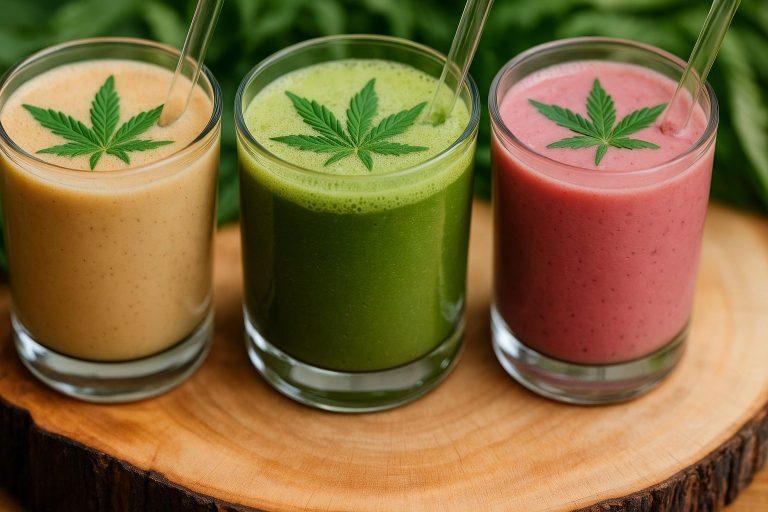
CBD Smoothie Recipes You’ll Actually Love
🥤 Simple, delicious ways to enjoy your daily CBD oil. Why Add CBD Oil to Your Smoothie? Smoothies are already a great way to
read more
A Calm Routine: How to Use CBD Skincare from Morning to Night
If your skincare shelf is starting to look more like a science lab, you’re not alone. These days, there’s a serum or cream
read more
From Mouse to Marathon: Can CBD Support Endurance Through the Gut?
Gut health has become a growing focus in the wellness world, and for good reason. The gut microbiome affects digestion, immunity, and even
read more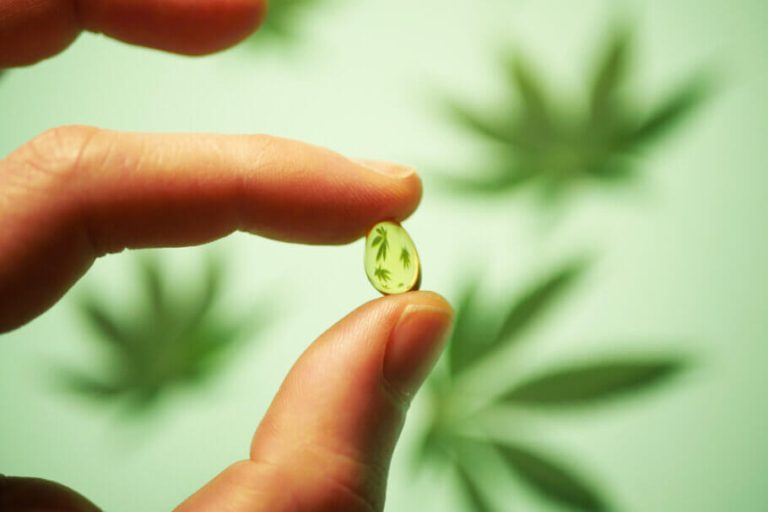
Microdosing CBD: Why Less is More
Many assume that more CBD means better results, but that’s not always true. Instead, taking smaller doses more frequently may be a smarter
read more
Sleep Naturally: How CBD, CBG, and CBN Can Enhance Your Rest
Quality sleep is essential, yet modern lifestyles often leave us restless. With rising stress levels and digital distractions, many are turning to natural
read more

